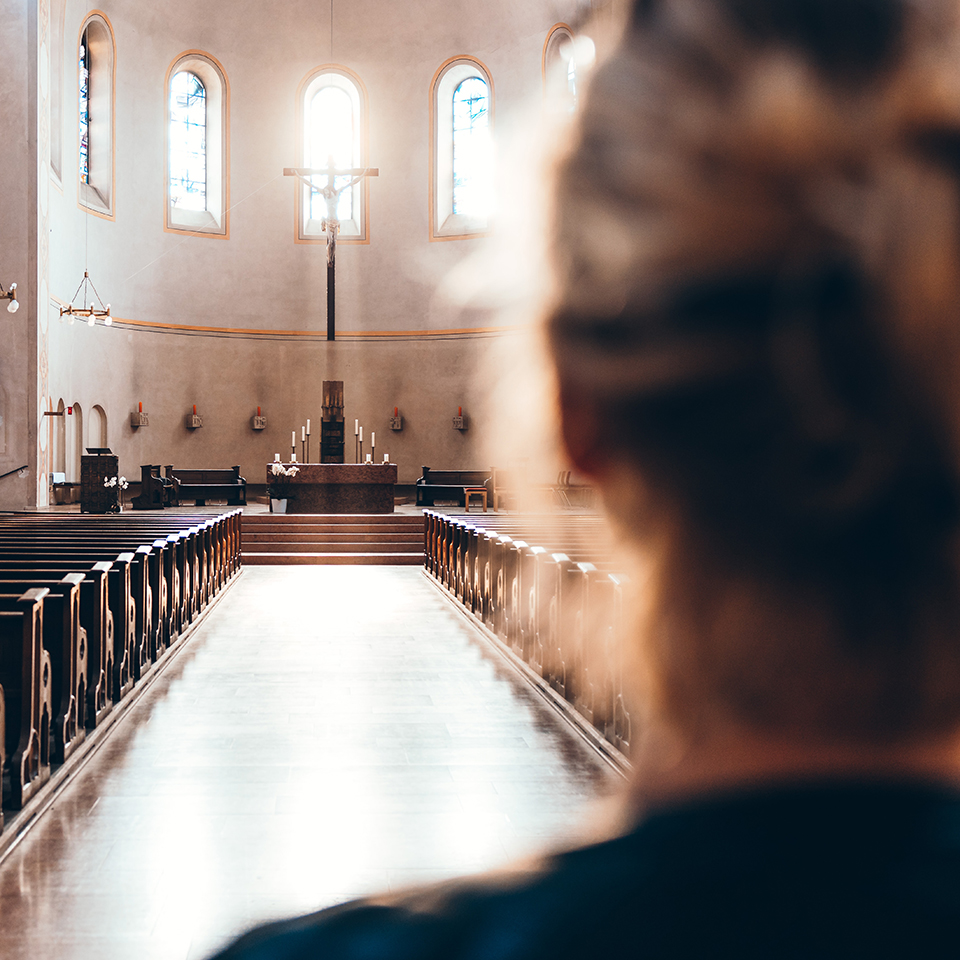Catholics “of a certain age” may remember being taught that, once having settled into a pew, our time before Mass was meant to be directed toward mentally and spiritually preparing ourselves for the great liturgies of Word and Eucharist—participation at which culminates in our physical Communion with the Body and Blood of Jesus Christ, the Incarnate Lord.
“You stop to think before answering a riddle, or a guessing game, or even a question asked by a teacher,” the sister who taught us would say. “Why would you not stop to think, and to pray, before encountering the mystery of the Mass, and before meeting Jesus so interiorly?”
Her logic seemed sound enough and I did grow to relish the “quiet time” before Mass—indeed, those spare preparatory moments of prayer and silence became as much a part of the Mass, for me, as the liturgies themselves. When people spoke in hushed tones around me, I took it as something reverent and respectful of the space, of the Tabernacle present to us, and of the prayerful people all around.
Over the decades, as the time before Mass became noisier—more reminiscent of an audience waiting for a show to begin than worshippers preparing their hearts—I’ve missed that silence. I’ve been told that this means I am an impediment to the “the building up of community” in my parish. No matter how often I had volunteered at fundraisers, taught catechesis, or worked with teen groups, it seems it all counted as nothing without my wholehearted participation in pre-Mass chit-chat—right up until the announcement of the entrance hymn.
One particularly chat-passionate woman suggested I confess my sin selfishness if I was more interested in praying for my own intentions, because chatting up the person next to me was “a kind of prayer and outreach” too. “Maybe the person next to you is lonely,” she said, “and your notice is something she really needs.”
“Maybe she’s a person who is already completely overwhelmed and is looking for a bit of silence herself for a few minutes, just like me,” I countered. “Am I supposed to just presume that she wants me bothering her with inane commentary?”
“No, you should never presume,” I was told. “But you should reach out, make the move, engage, and then—if she seems not to want to talk—look at the person to the other side of you. People like you, uninterested in others, is why our pews are emptying,” I was told.
Admittedly annoyed, I related a moment when I was deeply praying before Mass about the pressing concerns of a friend. I had been kneeling, clearly recollected and with eyes closed—only to have someone press me on the shoulder, demanding my attention and some conversation. Not a lot—just a “good morning, nice to see you, how is everyone”—but because I am no saint, my recollection was shattered, and my prayer was wrecked as I looked up in confusion, wondering what could possibly be so important as to disturb someone in prayer. Was there a fire? Were we being evacuated?
In my opinion, it was an ill-timed “outreach.” In the lobby, I’d have been happy to respond, but not at that particular moment. “I’m sure the woman meant well,” I told my interlocutor, “but it would have been a better, more generous thing, if rather than disturbing someone who is clearly at prayer, she’d simply offered up her own plea for the intentions I was so concentrated on. That, to me, speaks of community and outreach and unity, and much more powerfully than being unexpectedly touched by a stranger and forced to engage when and where I did not wish to.”
“That’s because you’re a basically antisocial person, more concerned with yourself than others,” I was told.
I don’t bother talking much to that person any more, and I’m sure she’s fine with that—there are lots of others for her to talk to, and she does, right up to and even through the Angus Dei, after the Sign of Peace. She is doing such stellar outreach, in fact, that I have decided I can keep my silence without feeling guilty about it. She’s got it covered.
Our disagreement has stayed with me though, and I’ve often wondered why we, as a Church, can no longer agree on something as simple as when to keep silent, and when to chat.
“To everything there is a season and a sign and purpose unto heaven,” goes the wise instruction from Ecclesiastes, which includes “a time to keep silence, and a time to speak” (Eccles. 3:1, 7).
This whole question seems a no-brainer to me: in the sanctuary, a place meant for prayer, we should simply err on the side of prayerful reverence in manner, with as little chitchat as possible, as supports the prayer of others. In the lobby, or anywhere else, let the social graces overflow.
For some, my thoughts on this are solemn nonsense bringing too much of a Martha-and-Mary mindset to the thing, so I was heartened this week to read that in his continuing catechesis on the Eucharist, Pope Francis—rather surprisingly to some—made a point of urging prayerful silence before Mass: “When we go to Mass, maybe we arrive five minutes before, and we start to chitchat with those in front of us.” However, he added, “it is not a moment for chitchat. It is a moment of silence for preparing ourselves for dialogue, a time for the heart to collect itself in order to prepare for the encounter with Jesus . . . silence is so important.”
Thank you, Papa, for the supportive instruction. It is a deep consolation to know that I’m not personally responsible for emptying the Church of its worshipers—at least not by my behavior in the pews. Out there in the lobby, and in the greater wide world, well . . . who knows?
